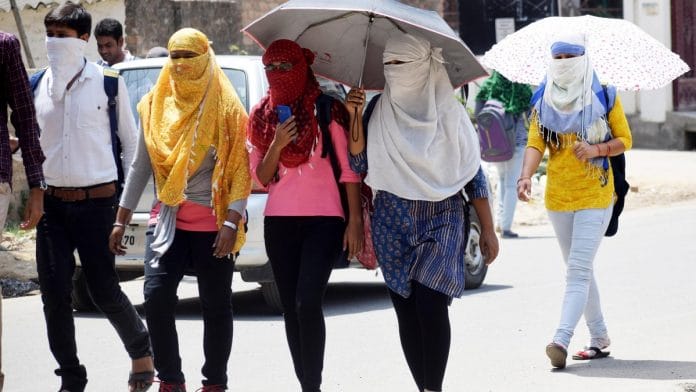New Delhi: The prestigious Indian Institute of Technology, Delhi, will now help Indians beat the heat. With temperatures routinely crossing the normal mark, IIT-Delhi and five other institutes will conduct a heat stress tolerance study across India.
Heat stress is the environmental condition where the body is unable to balance its temperature. The ability to exchange heat with the surroundings depends not only on temperature but also on humidity, wind, types of clothing, activity, and physical structure.
On Wednesday, temperature in Delhi touched 44°C, with heatwave conditions expected to hit the NCR in the next two days as mercury crosses the 45°C-mark.
The goal of the ‘Heat Stress Survey’ is to develop better heat management plans for Indians, including heat-related government warnings.
The Centre for Atmospheric Sciences (CAS), IIT-Delhi, is conducting the study, which is part of the project called ‘Heat Stress Index for India: Projection for Near Future’.
It will study heat stress tolerance thresholds and suggest possible interventions. The study will be done by involving public feedback from across the country. A person can participate in the survey by downloading an android app ‘Heat Stress Survey’ from the Google Play Store or through the website www.heatstressindia.in.
What the study will consist of
According to those involved in the study, the survey will seek people’s response to questions like at what time of the day they felt maximum discomfort, what was the nature of the day, whether it was dry or humid, and what was the kind of activity they undertook on a particular day.
“The project will help in formulating a better and efficient heat management plan across the country, as heat stress is expected to increase in global warming,” said professor Sagnik Dey from the CAS, the project’s principal investigator.
“Under searing heat, the human body struggles, and beyond a threshold stress condition, one cannot tolerate it anymore and can suffer heat stroke. Since India has diverse climatic conditions, it is important to define the thresholds of stress in different parts of the country. Even if heat stroke is avoided, stress can cause issues like headache, cell damage, renal failure, fatigue, neurological problems, kidney stones.
“This (project) will help the government to formulate appropriate heat management plans, especially when heat conditions are expected to worsen in India under global warming.”
One of the major components of this study is funded by the Department of Science and Technology, government of India, under the ‘Climate Change and Human Health Programme’.
The partner institutes in this project include IIT-Kanpur, the Indian Institute of Science Education and Research in Bhopal, the Ramakrishna Mission Vivekananda Educational and Research Institute in Kolkata, Sri Ramchandra Universityin Chennai and the Indian Institute of Public Health, Gandhinagar.
Also read: IIT, IIM and Oxford alumni make way into govt as lateral entry specialists






